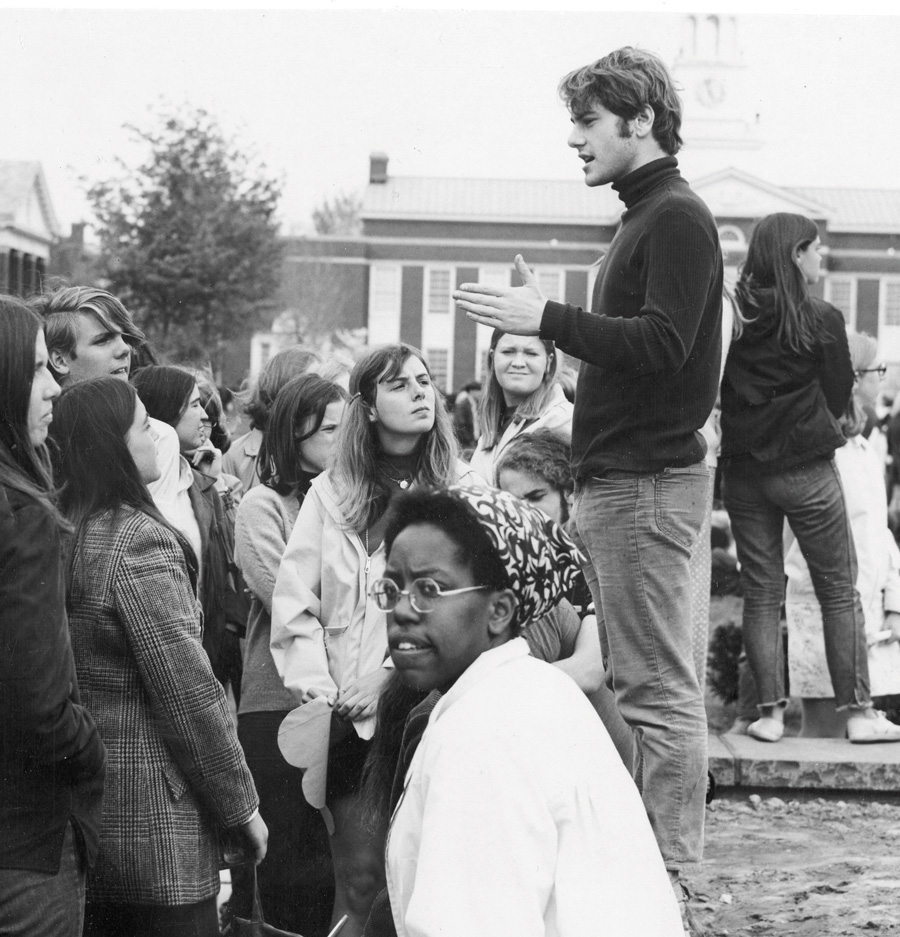The Civil War came to Pennsylvania in June 1863 when Gen. Robert E. Lee and the Confederate Army approached Gettysburg. At the University at Lewisburg, which became Bucknell in 1886, classes were still in session. Students stopped what they were doing to prepare to fight — 36 joined in.
Classes were suspended for six weeks, though the Female Institute and the Academy (a separate program that educated younger male students) remained open. Once the danger subsided, the men returned to Lewisburg, just in time for Commencement on July 30, 1863. While ceremony attendance was lower than usual, one observer said it “will ever be regarded as one of the very noblest in the history of the institution.”
More than 700 Bucknellians served in World War I, mostly in France but also in Belgium, Germany and Italy. They were soldiers, nurses, aid workers and ambulance drivers. Thirty-three died.
In February 1918, Bucknell announced it would end its school year three weeks early. Time spent in labs and lectures was unchanged, but students lost two weeklong breaks and attended classes on Washington’s Birthday and Memorial Day. Graduation was held May 31 instead of June 20.
“It would be the patriotic thing for the student body to do their bit in the great war by sacrificing a few days of vacation,” The Bucknellian reported.
The 1918 pandemic known as the Spanish flu killed an estimated 50 million people worldwide, including 675,000 in the United States.
Pennsylvania was among the hardest hit states, and the state capital of Harrisburg instituted closures to prevent spread of the disease over five weeks in fall 1918. At Bucknell, classes continued, though some Bucknell football games were affected. On Oct. 19, 1918, the team traveled to State College and was already on the field for warmups when health officials called off the game against Penn State.
On Wednesday, March 18, 1936, a heavy rain melted winter snow, causing one of the most devastating floods in Susquehanna River history.
With a crest of 32.1 feet in Lewisburg, it was the second-highest flood level in the town’s recorded history, behind only the 34.2-foot crest of 1972.
The flood damaged six fraternity houses and the Hunt and Harris residence halls. An estimated 150 students in canoes spent Wednesday paddling through Lewisburg streets to rescue flood victims, some of whom spent the night in Tustin Gymnasium.
Classes were canceled on Wednesday and Thursday, “sparsely attended” on Friday and Saturday, according to The Bucknellian, and resumed on Monday.
Classes continued throughout World War II, but in January 1942, Bucknell announced that it would “accelerate the education of students who desire to prepare themselves as quickly as possible for some kind of national service.”
That meant students could earn their degrees in three years instead of four with a switch from a semester system to a trimester one, with terms beginning in February, June and September. The accelerated program was mandatory for engineers but optional for all other students.
Bucknell also moved its 1942 Commencement forward by 16 days and canceled Easter vacation.

From May 4 to 9, 1970, Bucknell canceled classes to allow students and faculty to join a strike on campus.
The Association of Bucknell Students, along with Bucknell professors and students from nearby colleges, gathered outside the library to protest the U.S. invasion of Cambodia and the deaths of four unarmed protesters at Kent State University.
On Sept. 8, 2011, President John Bravman canceled classes after Hurricane Irene caused creeks on campus and in Lewisburg to overflow. Classes resumed the next day.
The flooding forced 500 students living off campus and 600 from Vedder, Harris and Larison halls to move to Gerhard Fieldhouse.
— Bryan Wendell
